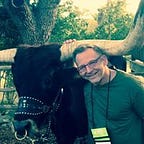How I learned Racism
Today we remember Martin Luther King Jr.
For my part, I’d like to ponder something I often hear some white people say, that African Americans can be racist too. This is, on its face, pretty ludicrous, but it harkens back to something many white people learn from an early age. That racism means that all you see about a person is their skin color. If I look at you and all I see is a black person, and if you look at me, and you distill me down to my skin color, then that’s being racist. Like so many myths and falsehoods surrounding white privilege, this one has a tiny grain of truth in it, and seems logical, and therefor, fair. But it misses so much that is crucial.
Racism is global, and found in cultures all across the planet. It always involves one group of people who “other” another group of people, delineating clear and rigid lines about who belongs in our group and who does not. But here in America, it has a really clear history and known path that led to Africans first, and African Americans now, as being other, treated as less than, and treated like they do not belong. Othering, always has an element of superiority connected to it- a looking down upon and keeping the other, in their place. Othering is fueled by and enforces a power differential. Racism is about maintaining a power differential where white people hold the power and others do not.
I think the solution is partly to stop thinking, simply that some people are racist and some aren’t, and accept and see that our culture breeds racism, perpetuates racism, and that racism pervades everything, for everyone, at least here in America.
I started thinking about this remembering my earliest lessons in race.
I grew up in a middle/upper middle class neighborhood in the suburbs of Pittsburgh. While all the steel workers lived in neighborhoods with clear ethnic flavors, the executives lived out in the suburbs. My grandparents both wanted the prestige of living in Mount Lebanon, a richer suburb, but hated all the trappings of that wealth, and selected another South Hills area where they could believe they were more accepting people. But in my elementary and junior high school class, there wasn’t a single African American. The only black kid I knew, was Curtis, the son of our cleaning lady, who would come with his mother, every Saturday, and we would play while she worked. I was trained from the earliest age to see who did and didn’t belong, all through unspoken lessons. I could like Curtis, but he belongs elsewhere. He didn’t belong in my boy scout troop or my school. I could like him, and he could be my playmate, but he still didn’t belong. Not because he was less than… just because that’s the way it was.
In fact, by high school, where kids came from a larger geographical area, there may have been some black kids, but I don’t remember them at all. Even at a young age, the lessons about who belonged and who didn’t, had been learned.
What does seem logical to me today, is that Curtis was learning lessons too. But the racism is there, in me , if I think his lessons were the same as mine. We both grew up in worlds where racism taught us lessons, shaped our worlds not to mention who we became as adults. He may have been learning who does and doesn’t belong, but from his perspective- through his eyes and his experience, the lessons may not have been the mirror opposite of mine. I can’t know what they were. I can’t know what racism “taught” him, unless I open my eyes and listen to him or other African Americans today.
Today, I know I was fed a lie and I learned it so easily. To like a black kid friend, but still learn that he didn’t belong, was cruel and damaging. To believe that I wasn’t racist because I had a black friend, while accepting that the way we are all segregated was, just the way it was, was harmful and sneakily perpetuated while superiority.
People may be racist, and calling that out may be essential. But our culture teaches all of us to other people not like ourself. Some white people learn that and express it in very overt ways. For others, we may have learned it in a sneaky covert way. Ending racism means we have to call out the way othering and other tools that perpetuate a power differential can be dismantled. Ending racism isn’t just about calling out who has power and uses it against others, but ending racism demands we stop and question why we believe a power differential should exist.
